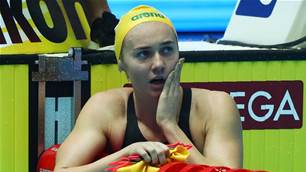The modern pentathlon ‒ how exactly did running, swimming, horse riding, fencing and pistol shooting get lumped together?
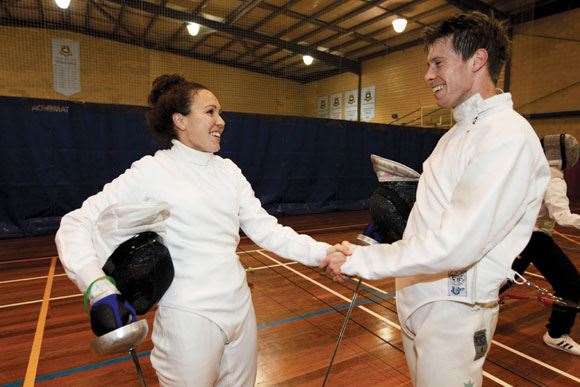 Photos By, Kathy Watt
Photos By, Kathy WattThe modern pentathlon ‒ how exactly did running, swimming, horse riding, fencing and pistol shooting get lumped together?
The modern pentathlon might be one of those events concocted to baffle Olympic viewers ‒ how exactly did running, swimming, horse riding, fencing and pistol shooting get lumped together? But its pedigree is as Olympian as it gets. It was invented by Pierre de Coubertin himself, as the founder of the modern Games dreamed up a pursuit that would reflect the skill set required of a 19th-century French cavalry officer delivering a message. Hence, you have a sport which, action-wise, could only be matched by an Errol Flynn movie marathon.
Olympic modern pentathlon turns 100 in London, having been introduced in Stockholm in 1912, where the fifth-place finisher was an impetuous American army lieutenant named George Patton (women’s pentathlon, however, didn’t start until Sydney 2000). The history matters to Australian hopeful Chloe Esposito, who is heading to her first Olympics next month. Her father, Daniel, was Australia’s representative in the modern pentathlon at the 1984 Olympic Games in Los Angeles, an example which encouraged the young Chloe to take up the sport – or at least, all the parts of it together – at 13.
Now that the 20-year-old Esposito has made the Games, she’s set her sights on becoming the nation’s first medallist in the event. She’s currently the eighth-ranked woman in the world, with fifth- and third-place finishes at the top-level World Cup Series events earlier this year in the United States and Brazil respectively.
The modern pentathlon plays out over a gruelling single day of competition, and at these Games will culminate with equestrian and the new running/shooting event at Greenwich Park. In London, though, the waiting might be the hardest part – as the schedule stands right now, the women’s modern pentathlon will be the very last event to finish at the 2012 Olympics.
Modern family
“Modern pentathlon isn’t very popular in Australia; a lot of people don’t even know about it. I’d wanted to do it ever since I knew Dad went to the Olympic Games for pentathlon.
“A lot of people ask me: how do they [the competitors] find out about pentathlon? I think they get into it through other people. For me, it was because of Dad. I never saw him compete. When I was younger he told me about it; we saw some old memorabilia and stuff like that. I started pentathlon when I was 13, but I’d swum and run at school from when I was little. Gradually, I built up my skill in all the sports, and when I was 13 I started the full pentathlon.
“Normally it’s swimmers, or people with a swimming and running background, who cross over to pentathlon. I know a lot of people overseas get into it through pony club; they do horse riding, then they pick up the other events.
“When I started shooting for pentathlon,I entered a few shooting competitions on weekends ... I got picked up by a few of the coaches there and started going to a few shooting camps. My shooting just got better, so I started competing in major individual shooting events (Esposito made the 2010 Youth Commonwealth Games team in 10m air pistol). But it was always for pentathlon.”
How it works
“Modern pentathlon starts off with fencing; in the Olympic Games there are 36 competitors. We do ‘one-touch’ with everyone; whoever gets the hit wins
that match. It’s over in one minute. Whoever gets the most fencing hits will get the most points.
“After that, it’s not ‘one discipline straight into another’ like triathlon. We’ll have an hour and a half’s break before the next event ‒ the 200m swimming race. The faster time you swim, the more points you get.
“Next is horse riding. We draw a number out of a hat which links up to a horse. You get 20 minutes to warm up with that horse. We get five jumps’ warm-up, and then we do a 12-obstacle course. There’s a maximum of 1200 points on offer. For every mistake – knockdown, refusal or falling off! – they deduct points. After those three events they tally the scores.
“The last event is the running and shooting. It’s a handicap start; whoever’s on the most points will start first and however many points you are behind equals your seconds handicap. We run to the shooting range. We need to get five successful shots, then we run a kilometre, five shots, a kilometre, five shots and then a kilometre to the finish. Whoever crosses the line first wins.”
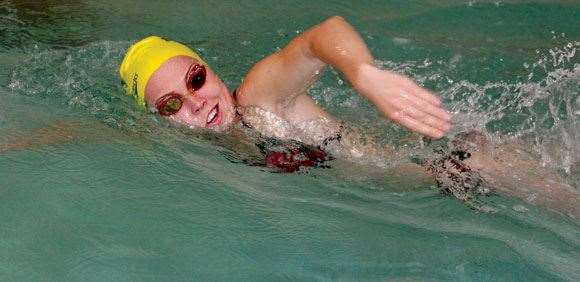 Photos By, Kathy Watt
Photos By, Kathy WattFire and finish
“This is the first Olympic Games where the modern pentathlon running and shooting will be combined. It’s a bit of a disadvantage to good shooters because it’s not a precision shooting event any more. It’s fast shooting – if you can shoot a seven [inside the fourth-smallest circle] it’s a successful shot, whereas the old system was score-based. If you shot more tens [bullseyes] it was better for you, but now you just need a ‘seven’ in the combined.
“I didn’t like the new system at first, but it’s probably one of my favourite events to watch now. It’s really exciting. You can make up massive amounts of time in the shooting and overtake a lot of people, and a lot of people drop back. If you’re a good shooter, you’re still advantaged by getting your shots off well and quickly ... you have to get five successful shots, but you have a maximum of a minute and ten seconds. Once it hits a minute-ten, you have to go, but if you’re there for a minute-ten, that’s really bad.
“They changed it to get more spectators ... It’s a lot more exciting, this combined event, than the normal shooting and running. At one competition we went to, the girl who won silver started in 16th position. When I was in China recently, I started in 20th, and moved up to 8th.
“The shooting definitely lifts your heart rate; your arm is moving around a lot more. I focus on holding my breath while I take my shot, which is hard at times, because you’re going max in the kilometre and you’re puffed out. In the running, it’s alright for me; I just run the kilometre as hard as I can. That’s what I train for, getting to the shooting range at max heart rate.”
Jill of all trades
“You need to be an all-rounder, but it’s also really good to have one strong event. One of the British girls, Samantha Murray, is a really strong swimmer, which puts her right up there.
“The horse riding doesn’t really make or break your overall performance, unless you fall off, but the points roughly stay the same with everyone. The running/shooting is the big one where people make up time. But if you have a really strong event and the rest are even, it’s a real advantage.
“Everyone is different. Some of the girls I compete against are really good at fencing, but their swimming is not that good ... For me, I have to work on not the physical side, but the mental side of fencing. I’ve got all the moves and know what to do, but it’s all up in my head.”
Week in, week out
“I’ll swim six times a week, getting up at 4.30am and starting at 5am at the pool for a two-hour session. I run four times a week; that’s all different types: a track session, a long run, some hill work, interval training ...
“One of the runs is a run-shoot. I don’t normally shoot with a laser pistol [which will be used at London 2012]; I shoot with a .22 sport pistol. The target’s 25m away and I’m using live ammunition – I do that so it strengthens my wrist; when I go back to laser, it’s easier to shoot. I run to the back of the shooting range, there’s a big grassed area at the Sydney International Shooting Centre where they had the 2000 Games, and I can do kilometre loops, then come in and shoot.
“I practise shooting five times a week, horse riding three times a week and fencing four times. I’ll go out to the riding stables and we’ll jump every lesson, and I’ll ride three or four different horses in the session so I get a feel for different ones.
“I do weights three times a week, and I also get a massage once a week to recover from my training sessions. The weights I do are for my arms, based around swimming, so I can pull through the water faster.
“The time I dedicate to each sport is probably even – I might do a little less running, only because training for that goes a lot faster than swimming – I’ll swim for two hours, and the run might be one hour. Swimming would take up the most time; I do a lot of kilometres in the water. And there’s a lot of travel time in between.”
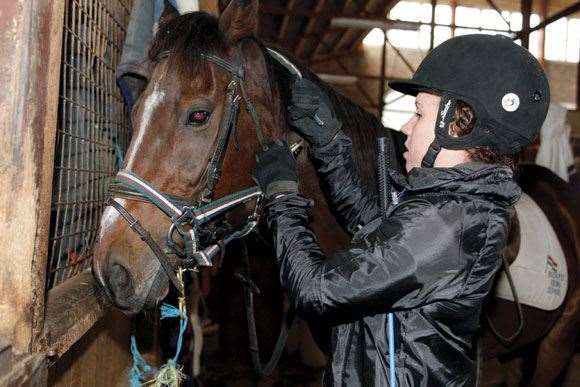 Photos By, Kathy Watt
Photos By, Kathy WattCrazy horses ... and swords
“In modern pentathlon, there’s an owners’ round the day before; it’s the horses’ owners riding the course ‒ they know their horse best. When we get on them, sometimes we get crazy horses; they’re a bit psycho. Some people in pentathlon don’t consider the horse riding very important; they’ll do some training close to the event. I don’t like doing it that way because I like having everything right. It can be that one important competition, and you might get that crazy horse ‒ I want to be as prepared as possible. I was overseas, training in France, and my coach would ask for a horse that stops at the jump, so I could practise and know how to deal with horses like that.
“I have fencing lessons four times a week; three times I’ll fence other people, practising different things ... competitions to 15. The fencing’s not good at all in Australia. We haven’t qualified anyone for the Olympics. When I was over in France, I was training in fencing there, and the structure was so different; just really hard, good fencing training from a young age.”
How many coaches?
“I don’t have five ... my main coach is my Dad; he coaches me in swimming, running and shooting and is my mentor. He goes away with me to competitions. Then I have a coach for fencing and horse riding, who was my Dad’s coach as well, Laslo Petho. When I was on the Australian shooting team, I used to go to camps and have a shooting coach, but now it’s Dad who helps me there. When I go to the track to run, I have a track running coach.”
Pent-up energy
“On competition day, I normally just get ready for the next event, relax, have something to eat, listen to some music ‒ just think about my next event. I listen to anything I have on my iPod; I have some pump-up music that I listen to before the fencing and swimming to get me ready.
“Some people have naps. You want to rest as much as you can to get ready. In a competition, the fencing would start at, say, 8.30am and the combined would finishat 6pm or 6.30pm. Normally, all the events are close together. In London there’ll be three different venues: the fencing’s at one, the swimming’s at the aquatic centre and the horse riding and the combined are at a different place. But they’re all close to one another, a five-minute bus ride or something.
“It can get tiring through the whole day, but that’s what you train for. You’re backing up for your next training session, so during the day, I’m doing three or four training sessions, to make it like a competition: training and having a rest, training and having a rest ... it’s full-on, but you’re always ready for competition day ... when you have that extra buzz ... ”
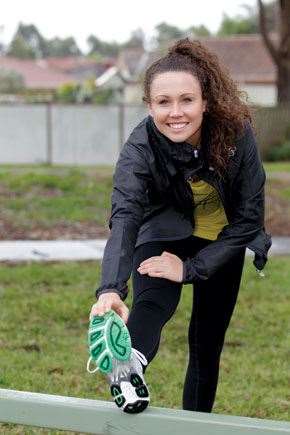 Photos By, Kathy Watt
Photos By, Kathy WattFinal-day focus
“I’ll be at the Opening Ceremony at London. I’ll be there for two or three days, then I’m going to France; I’ll stay there for eight days’ training, then come back to London before my event so I won’t get distracted in between. A lot of people will be finishing while I haven’t even started!
“It’s one day ‒ the last day ‒ and that’s it. I think I’ll be there three days before the event. I’ll stay at the [athletes’] village ... everyone will be partying. It’ll be a bit hard, but I’ll be okay.”
Which five sports?
“No one really ever knows. At school, everyone was like, ‘What’s pentathlon?’ People don’t see me as someone holding a gun or fighting with a sword, so people are like, ‘Oh, really?’ A lot of people are shocked.
“To tell you the truth, if I wasn’t doing pentathlon, I don’t know what sport I’d be doing. I wouldn’t be fast enough to be a swimmer or runner of Olympic standard. I really enjoy the shooting side; I’d probably get into that. And you can do shooting for ages.
“A lot of the girls I compete against are about 27, 28; some compete into their 30s ... Pentathlon is so expensive – training, travelling. This is the first year I’ve ever received funding from the Australian Olympic Committee. Before that, Mum and Dad were paying for everything.
“In Europe, one of their competitors’ biggest advantages is regular competition. We have, really, no competitions here. They’d be competing against each other all the time there. I went to Europe for eight weeks this year and it was: competition, training camp, competition, training camp ... My brother is starting pentathlon, and Dad is telling him, ‘If you want to be number one, you have to be based over there.’”
– Jeff Centenera
Related Articles

I was not born to run
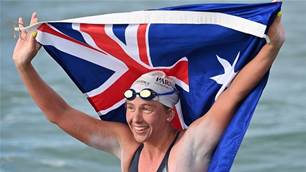
Australian Chloë McCardel is now Queen of the English Channel
